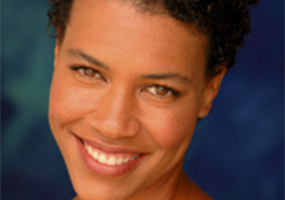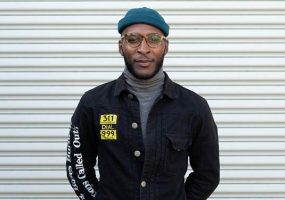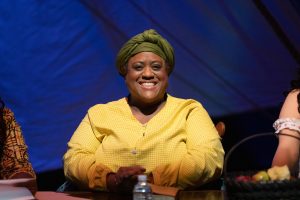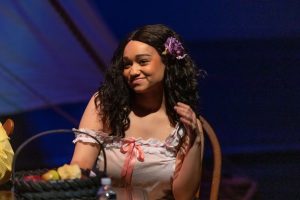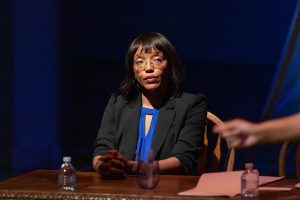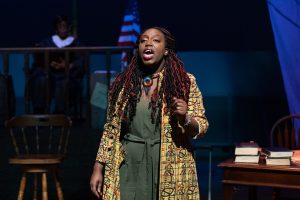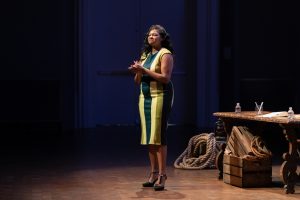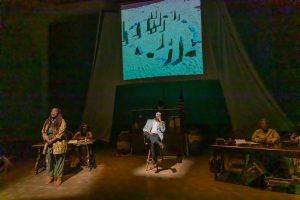| Saturday | February 15 Opening |
8pm |
| Sunday | February 16 | 3pm |
| Saturday | February 22 | 8pm |
| Sunday | February 23 | 3pm |
| Saturday | February 29 | 8pm |
| Sunday | March 1 | 3pm |
Running time: Approximately 2 hours with one 15 minute intermission
Recommended minimum age: 10
Venue
Taube Atrium Theater
401 Van Ness Avenue, 4th Floor
San Francisco, CA, 94102
Nearest BART Station: Civic Center
Photos
To view and download high resolution press photos, please visit the Press & Photo Gallery page.
Press
San Francisco Examiner
Contemporary satire puts black female stereotypes on trial
by Leslie Katz
Program Book
Download the The Trial Program BookKarani Marcia Leslie Johnson’s
The Trial of One Short-Sighted Black Woman vs. Mammy Louise and Safreeta Mae
Directed by Sherri Young
This satirical play by Karani Marcia Leslie Johnson is set up as a mock trial of black female identity—specifically the jovial, asexual and servile “mammy,” along with the hyper-sexualized Jezebel-like “Safreeta Mae” stereotypes, which the main character charges, are actually based on television, advertising and the movies, not reality. And it is these stereotypes that have impeded her success in making it up the entertainment industry’s corporate ladder. Interestingly, the playwright herself was an editor and staff writer for CBS, NBC and Fox, with credits that also include The Cosby Show and Parenthood.
#TheTrialAASC
Director’s Note
Looking back at my youth, there was such a need to fit in and belong. I remember one day wearing afro-puffs in South Lake Tahoe and a little white girl younger than I pointed at my hair and said, “Mom, her hair looks funny.” My problem was that I had no idea who she was talking about so I looked around to see the girl with the funny hair only to realize it was me. So much of my childhood, I tried to fly under the radar. Not be too brash, too outspoken, too this — and sometimes too black.
Which is why when my mother would go out of her way to point out all of those things that made us black from our clothes, to our music, and even the friends we had chosen — there was hurt in our mother eyes when I chose to veer away from this in a stance of wanting to not be an “other”.
I never understood the need to seek out our history, learn about my family members, and develop that black pride. Waving a flag of your blackness seemed redundant as I carry it wherever I go… it never leaves me.
Now as an adult, I understand what she was really trying to create was a foundation and roots to build strong women. She wanted us to be proud and fierce and to never forget from where we came because so many people in this world will tell your own story and will always get it wrong. So we have kings and queens among us who have forgotten themselves.
Through the strength of connecting our history and culture, the process of inheriting this pride and understanding of the people was designed to withstand any wind, storm, or threat. I see now, my mother was giving me the strength so that no one was able to knock me down — because the roots were so deep, so strong, and filled with fortitude that her children would never allow an “other” to dictate who I am, or what I could be.
The Trial is a remnant of my mother’s message and I would play the role of Victoria Dryer: “why do I have to know this stuff?” I can now cringe at my words I use to think or say out loud when my mother made attempts to push me in the direction of embracing my culture.
What we both needed to learn is that those roots are so strong there was never any need to force the connection, because when enough growth happens and you realize your history, learn from the people around you, and really see them — you become connected. We become stronger.
This play is a dedication for those who have not found the strength of their connection; and for those who have been reaching out to connect with our lost community.
— Sherri Young
Cast

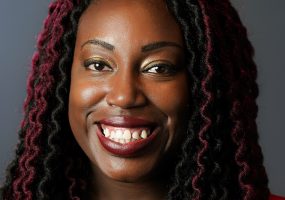
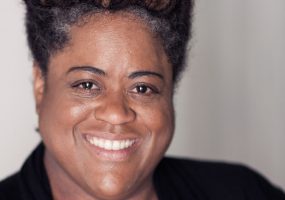




Production Team



